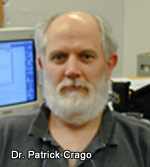
When the spinal cord is injured, commands and sensations can’t travel between the limbs and the brain, so arms and legs are can’t respond to the will to move. Until recently, physicians have not been able to offer spinal cord injury patients much hope for regaining function.
But if the brain’s intention could be communicated to muscles by detouring around the damaged spinal cord, movement might be restored. As you’ll hear in podcast #10, that’s just what Dr. Patrick Crago is doing with small, implantable electrodes to stimulate muscles to contract, thereby restoring some function to hands and arms. Working with what they call “neural prostheses,” Dr. Crago and his team are developing ways to make the stimulated muscles act in a coordinated way so that people with spinal cord injuries can grasp objects and, in the second generation neural prosthesis, reach for things overhead.
About 200 patients have benefited from a first generation system that provided hand grasp function. Dr. Crago and his colleagues are now working on a system that provides function to the wrist and elbow; over 40 patients around the world are using this latest upper extremity neural prostheses.
Patrick E. Crago, PhD, is the Allen H. and Constance T. Ford Professor and chairman of the Department of Biomedical Engineering at Case Western Reserve University. For more information about his research, visit Dr. Crago’s web site. [http://bme.case.edu/faculty_staff/crago/]
To learn more about the work of Dr. Crago and his colleagues, please see the Cleveland Functional Electrical Stimulation Center web site. To inquire about participating in a clinical trial, Dr. Crago suggests that you contact the center.
Hosts Leah Kauffman and John Murphy. Interview by Leah Kauffman.
For more information about the McGowan Institute for Regenerative Medicine, visit:
McGowan Institute Research Site
McGowan Institute Patient Site
McGowan Institute on Facebook


